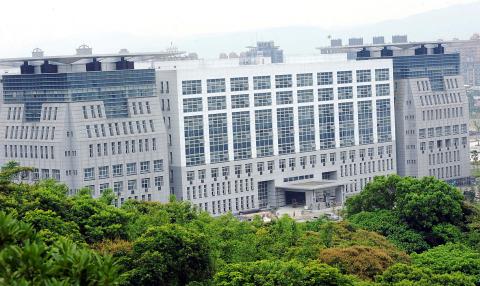The lack of protection against electromagnetic pulse (EMP) weapons at the Ministry of National Defense’s (MND) new headquarters is “irresponsible” and could endanger Taiwan, a Democratic Progressive Party (DPP) lawmaker said yesterday.
Senior military leaders told the Chinese-language Liberty Times (the Taipei Times’ sister newspaper) that the buildings under construction in Taipei’s Dazhi (大直) would not be outfitted with EMP countermeasures as planned because of budget problems.
The NT$200 million (US$6.9 million) system was scrapped despite comprising just 1.3 percent of the facility’s total construction budget and the NT$84 million already invested in the system, the Liberty Times quoted sources as saying, adding that the military was not happy.

Photo: Chang Chia-ming, Taipei Times
The information comes amid news that China has been developing EMP weapons in the event of a conflict with Taiwan.
EMP weapons can be used to emit a huge pulse of electromagnetic radiation that can knock out all electronics — particularly computers — over a widespread area.
“The Ministry of National Defense should have built the protection regardless of its budgetary concerns,” DPP Legislator Tsai Huang-liang (蔡煌瑯) said.
“Without it, it is like a soldier going to a battlefield not carrying a gun. Our whole military network could be completely taken offline,” Tsai said.
The long-delayed headquarters complex has been under construction since 2003. Originally envisioned to be a state-of-the-art facility, the construction process has been plagued by contractor problems, including a bankruptcy, leading to a Control Yuan probe.
The report about the lack of an EMP shield could trigger new questions over the practicality of the NT$15.8 billion project.
Military analysts believe that China could be planning to cause a massive low-altitude EMP burst over Taiwan in the event of an armed conflict in such a way that would severely damage electronics — disabling weapons systems — but kill few people and not impact China.
That scenario was detailed by a 2005 National Ground Intelligence Center report declassified earlier this month. China’s EMP capability could be used as a surprise measure after an initial strike to help dissuade the US from intervening, the report said.
Ministry spokesperson Colonel Lo Shao-ho (羅紹和) told the Liberty Times that the decision to drop EMP protection was made four years ago after changes to the building’s design increased construction costs. However, the NT$84 million already invested in the system meant it could be added at a later point, he said.
Chinese Nationalist Party (KMT) Legislator Lin Yu-fang (林郁方) said the system should be put in place now, given the concerns raised by the recently released intelligence report.
“It should be finished,” Lin said. “One EMP blast could immediately knock out any product using a power transformer, including computers and other electronics ... it would be too late to deal with the aftereffects.”

SECURITY: As China is ‘reshaping’ Hong Kong’s population, Taiwan must raise the eligibility threshold for applications from Hong Kongers, Chiu Chui-cheng said When Hong Kong and Macau citizens apply for residency in Taiwan, it would be under a new category that includes a “national security observation period,” Mainland Affairs Council (MAC) Minister Chiu Chui-cheng (邱垂正) said yesterday. President William Lai (賴清德) on March 13 announced 17 strategies to counter China’s aggression toward Taiwan, including incorporating national security considerations into the review process for residency applications from Hong Kong and Macau citizens. The situation in Hong Kong is constantly changing, Chiu said to media yesterday on the sidelines of the Taipei Technology Run hosted by the Taipei Neihu Technology Park Development Association. With

A US Marine Corps regiment equipped with Naval Strike Missiles (NSM) is set to participate in the upcoming Balikatan 25 exercise in the Luzon Strait, marking the system’s first-ever deployment in the Philippines. US and Philippine officials have separately confirmed that the Navy Marine Expeditionary Ship Interdiction System (NMESIS) — the mobile launch platform for the Naval Strike Missile — would take part in the joint exercise. The missiles are being deployed to “a strategic first island chain chokepoint” in the waters between Taiwan proper and the Philippines, US-based Naval News reported. “The Luzon Strait and Bashi Channel represent a critical access

CARROT AND STICK: While unrelenting in its military threats, China attracted nearly 40,000 Taiwanese to over 400 business events last year Nearly 40,000 Taiwanese last year joined industry events in China, such as conferences and trade fairs, supported by the Chinese government, a study showed yesterday, as Beijing ramps up a charm offensive toward Taipei alongside military pressure. China has long taken a carrot-and-stick approach to Taiwan, threatening it with the prospect of military action while reaching out to those it believes are amenable to Beijing’s point of view. Taiwanese security officials are wary of what they see as Beijing’s influence campaigns to sway public opinion after Taipei and Beijing gradually resumed travel links halted by the COVID-19 pandemic, but the scale of

Pope Francis is be laid to rest on Saturday after lying in state for three days in St Peter’s Basilica, where the faithful are expected to flock to pay their respects to history’s first Latin American pontiff. The cardinals met yesterday in the Vatican’s synod hall to chart the next steps before a conclave begins to choose Francis’ successor, as condolences poured in from around the world. According to current norms, the conclave must begin between May 5 and 10. The cardinals set the funeral for Saturday at 10am in St Peter’s Square, to be celebrated by the dean of the College